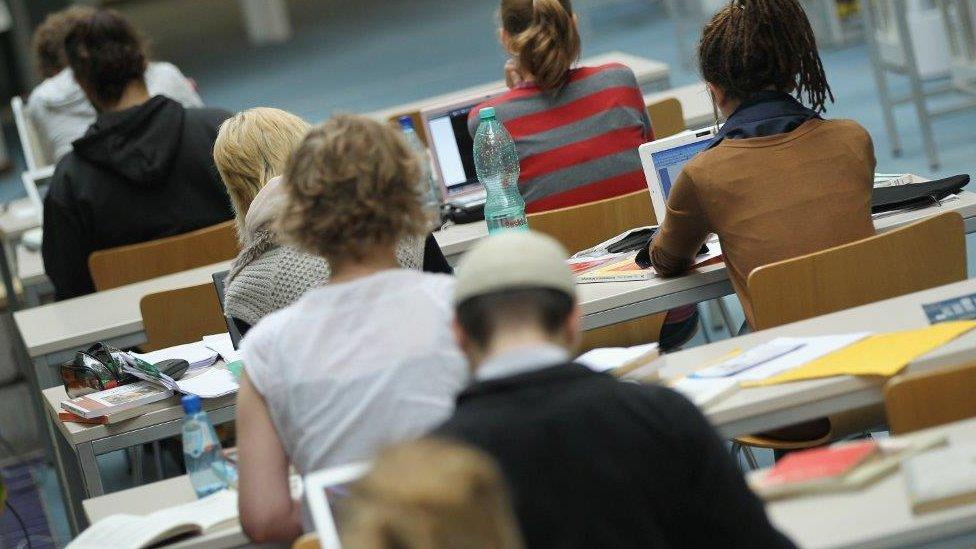Young people fear for futures in Brexit Britain, says study
- Published
- comments

Many of those questioned felt unprepared for modern life and work
More than two-thirds of young people in the UK have an "international outlook" and many fear for their prospects once the UK leaves the EU, says a report.
Ipsos Mori questioned a representative group of almost 2,000 18 to 30-year-olds for a study by cross-party think tank Demos, for the British Council.
Overall, young people said they feel "overburdened" by responsibility and "multiple barriers", says the report.
Ministers said schools worked hard to prepare pupils for life in a modern UK.
The report is part of the British Council's Next Generation, external series of studies of young people in countries facing pivotal change - others include reports on Bangladesh, Ukraine, Colombia, Turkey and South Africa.
Alongside the survey, the researchers held focus groups and workshops with young people across the UK.
'Looking inwards'
Many of those interviewed were still "angry and emotional" about last year's vote to leave the EU but the report notes that, while 69% of young people who voted were in favour of remaining, about half did not vote.
Of those polled, six in 10 said they would vote to remain if another referendum was held now.
"While there are certainly those who see leaving the EU as a great opportunity, many participants in our focus groups were worried about impacts on their lives, prospects and future plans, including constraining opportunities to work and study in other countries," says the report.
"Furthermore there was some concern that internationally the UK will be seen as a country looking inwards at a time when global co-operation has never been more important."
According to the survey:
68% of those polled believe international experience and a global outlook are essential for their future goals
57% are positive about the effects of globalisation on their own lives
But almost a quarter said they had been unable to experience any form of international engagement, whether learning a foreign language or living and studying abroad.
The report found divisions along socio-economic, educational and regional lines, with young Britons from poorer families, with lower educational attainment and parents without degrees, far less likely to be positive about globalisation or to have an international outlook.
The same was true for those from the North of England and the Midlands compared with London and the South.

Young people want educators to focus more on life skills and less on grades
The report also found many were frustrated with an education system they saw as overly focused on grades rather than life skills like money management, healthy eating, mental health and relationships.
About half felt their education had failed to properly prepare them for the world of work or for adulthood generally.
Many felt constrained by a lack of affordable housing, limited career opportunities and poor pay and conditions.
Recommendations based on the findings by a UK-wide panel of young people brought together for the report, include:
better international work and study opportunities for a wider range of young people
better politics and citizenship education
more focus on young people by local politicians
fairer workplace treatment for all young people
a greater focus by educators on building pupils' resilience to the demands of modern life and work.
Lead author Ian Wybron said: "Our research confirms that many young adults feel frustrated with an education system and labour market that doesn't work for them - and the young advisers behind this project urge the government to take steps to redress inequality of opportunity.
"Young adults want reassurances that government will work to maintain and grow opportunities for young people to connect abroad and not just for the usual suspects who do so already."
A spokesman for the Department for Education said: "We have been clear that Britain should always remain a truly outward looking, global nation.
"Schools already prepare pupils for life in modern Britain by teaching them the knowledge, skills and values they need to fulfil their potential.
"For example, the citizenship curriculum teaches young people to play a full role in society and we have introduced both a national and international citizen service to support this.
"We recognise the value of international exchange programmes and collaboration in education and training, and are investing over £70m this year in high quality careers provision for young people."